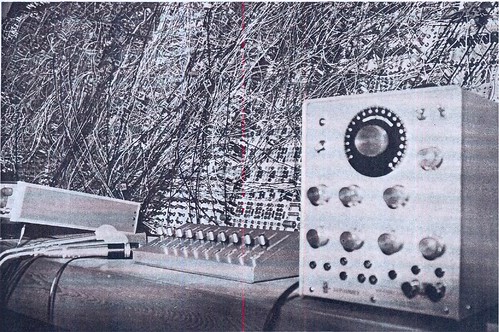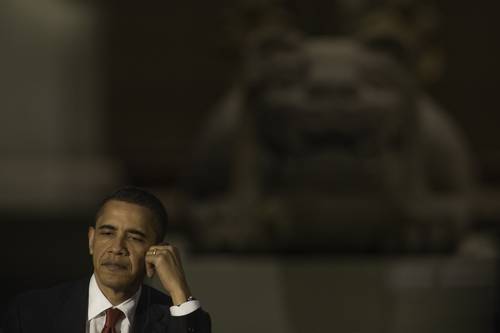 By Alfredo Jalife-Rahme, English translation by Gerardo Alejos.
By Alfredo Jalife-Rahme, English translation by Gerardo Alejos.With the sadly comical exception of [Mexico’s President Felipe] Calderon and his team of the “best economists of the world”, it should be noted that less than a month after the dysfunctional G-20 summit was held –in both senses of the word– in London, the Anglo-Saxon power spheres do not seem pleased with the results of the summit.
The British press –at large– has shown a healthy dose of skepticism; a prime example of this is Martin Wolf, editor of economy of The Financial Times, the mouthpiece of neoliberal globalization. Five days after the summit, the newspaper filed away the news stories on the G-20 and focused on the G-2 [relationship] as the tightrope of the global financial crisis.
Henry C. K. Liu –born in Hong Kong, a Harvard-graduated architect and urban planner who started an investment firm in New York, also a prolific contributor to the Asia Times Online site– finally brought up, with a 3-month delay (4/22/09), Zbigniew Brzezinski’s bold proposal to create a G-2 between the US and China, which “could change the world.” (Brzezinski was a national security advisor to president Jimmy Carter and is now a member of [President Barack] Obama’s closest circle of advisors).
Liu reports that Brzezinski “made his proposal for a US-China G-2 in a speech delivered during a conference in Beijing on January 13, 2009, a week before Obama was scheduled to be inaugurated as president, to commemorate [sic] the 30th anniversary of the establishment of diplomatic relations between the US and China.”
The details, which may seem boring, are actually crucial: “the conference was sponsored by the Chinese People's Institute of Foreign Affairs and the Kissinger Institute on [sic] China and the United States, and co-sponsored by the National Committee on US-China Relations, with support from both the US Embassy in Beijing and the Chinese Ministry of Foreign Affairs.”
The “large US delegation” was led by former president Carter –“during whose administration diplomatic relations were established”–, former secretary of State, Republican Henry Kissinger, and former national security advisors Brent Scowcroft (R) and Brzezinski (D), who were “formally received” by President Hu Jintao, Vice President Xi Jinping and Premier Wen Jiabao.
In the formal abstract of Brzezinski’s conference, which he published in The Financial Times (1/13/09), Brzezinski recalls that Carter sent him “to China in 1978 to initiate the secret negotiations that resulted in the normalisation of US-China relations.” He then speculates that “our world is different, better (supersic!) and safer (extrasic!) because of that normalisation.” Can anyone believe him?!
He says that “the effect” of this cooperation on security matters, which strengthened both countries, “was to change the cold war’s global chessboard –to the disadvantage of the Soviet Union.” The legendary russophobia of the Polish-Canadian-American Brzezinsky comes to the fore, as well as the proverbial perfidiousness of Kissinger, who fooled the naive soviets time and time again while selling them out to the Chinese.
According to Brzezinski, “indirectly (sic), the normalisation facilitated Chairman Deng Xiaoping’s decision to undertake a comprehensive economic reform.” It is clear, as I’ve said before, that the Chinese reforms in order to relatively open its market were not created in a vacuum; they were the result of a geostrategic settlement between the US and China against the USSR, something that [former president Richard] Nixon and Kissinger had already negotiated since 1972 –so Brzezinski shouldn’t take full credit on this.
And it is even clearer that Kissinger and Brzezinski are two sides –a Republican and a Democrat one– of the same coin: the geostrategic irredentism of the US.
Brzezinski weighs up the present situation of the bilateral relations and cites the Liaowang magazine (7/14/08), which describes the present relation between the US and China as a “complex interdependence, in which both sides evaluate each other in pragmatic and moderate terms and in which the two sides can compete and consult within the existing international rules.”
Then Brzezinski wrote a sentence that has upset the Chinese geostrategists: “a globally ascending China is a revisionist power (supersic!) in that it desires important changes in the international system.” But he softens his blow and also theorizes that China seeks for changes “in a patient, prudent and peaceful fashion.” This represents the exact opposite of [former president George W.] Bush’s take-over tactics which Obama is epiphenomenologically [incidentally] distancing himself from, as of today.
He infers that China has changed more than the US: “Chinese strategic thinking has moved away from (…) global class conflict (sic) and violent revolution,” and China is “peacefully rising” in global influence while seeking a “harmonious world”.
Brzezinski is fixated on the term “global”. In his [most notorious] book (“The Grand Chessboard: American Primacy [sic] and its Geostrategic Imperatives [sic]”), the term “global” [actually] represents Washington’s power, which he believed would last forever –he wrote the book 13 years ago, during the era of unipolar paroxism–; however, [the truth is that] the US power is speeding towards an implosion.
Brzezinski also says that the “North Korea nuclear programme” is one of the areas in which both US and China can “cope with residual or potential disagreements.” And he adds that as long as the US and China understand “the centrality” of their “interdependence”, they will “be able to cope with other contentious issues.”
Always leaning towards megalomania, Brzezinski proposes a “shared grand goal” that will “widen and deepen [the US-China] geostrategic co-operation, beyond the immediate need for close collaboration in coping with the economic crisis.” Yet [it seems clear that] finance and economy are not Brzezinski’s areas of expertise, so he prefers to leave those matters to Obama’s monetarist triplets: Summers-Geithner-Bernanke,
Brzezinski comfortably defines the three areas of “grand geostrategic cooperation”:
1) [China’s] direct participation in the dialogue with Iran;
2) [the participation of China in the] consultations and then [in the] informal mediation regarding India and Pakistan, and
3) the resolution of the Israeli-Palestinian conflict.
These three areas seem to represent Brzezinski’s diplomatic “carrot”. If it fails, it might be followed by a military “stick”, in which China would suffer the most lethal consequences, which –we venture to say– would be:
1) “oil-related consequences” –given the possible interruption of the oil supply in the “Greater Middle Eastern” region, which includes Iran–, and
2) “nuclear consequences” –the “regional calamity” that would occur if a nuclear conflict breaks out between India and Pakistan, two countries that border China–.
Under the explicit threat of the Huntingtonian clash of civilizations, lies the US’ highly lethal capacity to cause damage to China in the “Greater Middle Eastern” region –specifically in Palestine, Iran and the Indian subcontinent– if China does not accept the G-2 model.
Will China once again accept the Faustian pact proposed by Brzezinski –and seconded by Kissinger– in order to –once again– besiege Russia? What would happen to multipolar harmony?
- Originally published in the column Bajo la Lupa of the newspaper La Jornada, April 26, 2009, Mexico City.










